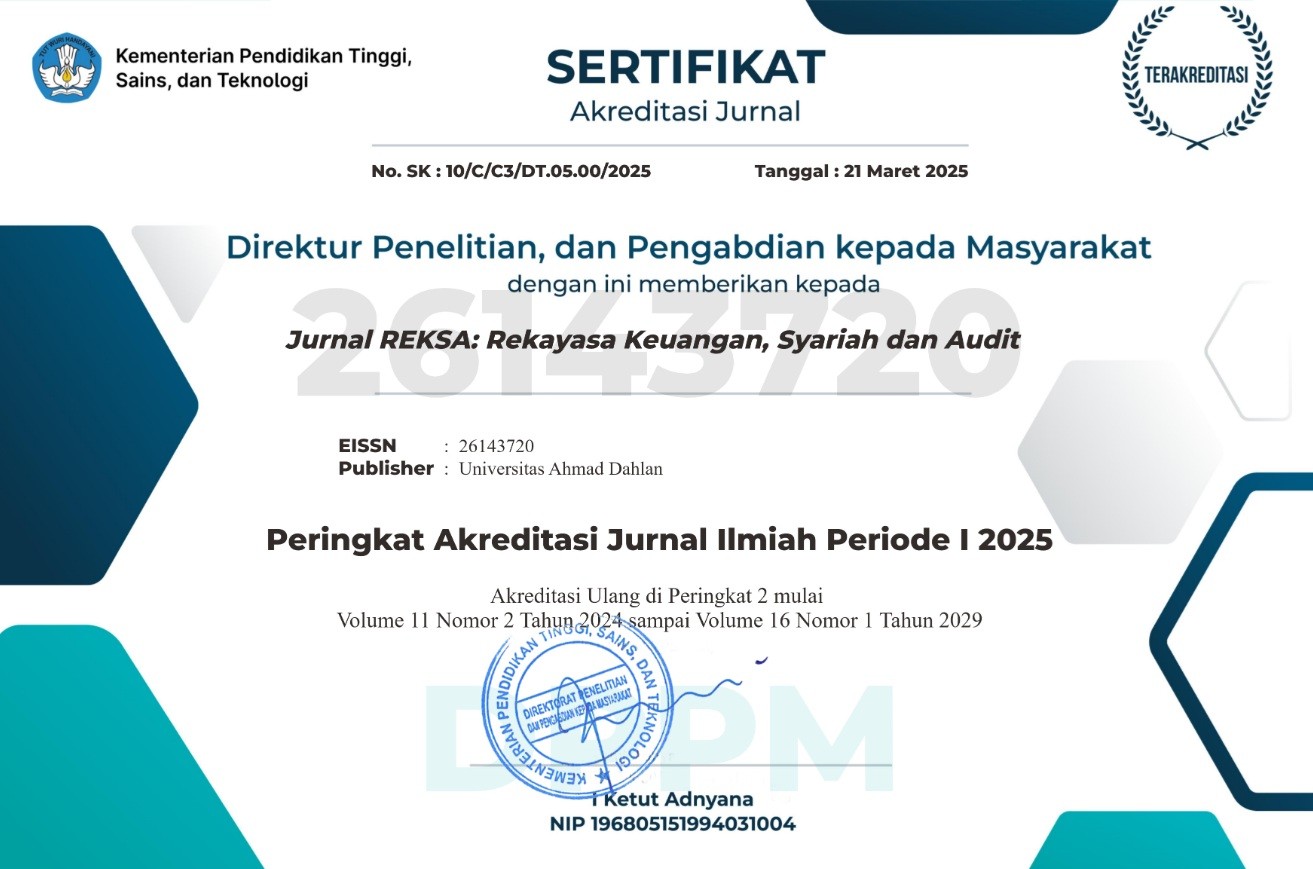ANALISIS PERSEPSI MAHASISWA TERHADAP ADANYA AKUNTANSI FORENSIK
DOI:
https://doi.org/10.12928/j.reksa.v5i2.2552Keywords:
student perception, forensic accountingAbstract
This study aims to analyze students' perceptions about forensic accounting. As a tool to accelerate the eradication of corruption and combating fraud, forensic accounting is included in the accounting education curriculum, but forensic accounting has not received serious attention from the university. This study analyzes whether there are differences in perceptions about forensic accounting between accounting students of Faculty of Economics and Business, Universitas Sumatera Utara (FEB USU) and Faculty of Sharia, Universitas Islam Negeri Sumatera Utara (FS UINSU). This research is an empirical study with purposive sampling technique in data collection. The sample in this study were 102 respondents, consisting of 67 accounting students of FEB USU and 35 accounting students of FS UINSU. The results showed that there was a significant difference between the perception of accounting students of FEB USU and FS UINSU on forensic accounting.References
Bologna, J. G., dan Lindquist, R. J. (1987). Fraud Auditing and Forensic Accounting. New York: Willey.
Fleming, A. Scott, dkk. (2008). ‘West Virginia University: Forensic Accounting and Fraud Investigative (FAFI)’, Journal of Economics and Business, 23(4), pp. 573-580.
Ipprianto. (2009). ‘Persepsi Akademisi dan Praktisi terhadap Keahlian Akuntan Forensik’. Tesis.
Mulyanti, Evi. (2012). ‘Persepsi Akademisi Universitas Sumatera Utara Terhadap Adanya Akuntansi Forensik. Skripsi.
Kamus Besar Bahasa Indonesia. 1998. Departemen Pendidikan dan Kebudayaan, Balai Pustaka.
Robbins, Stephen P. (2003). Perilaku Organisasi: Edisi Bahasa Indonesia. PT Indeks: Jakarta.
Tuanakotta, Theodorus M.2007. ‘’Akuntansi Forensik dan Audit Investigatif. Jakarta: Lembaga Penerbit Fakultas Ekonomi Universitas Indonesia.
Fleming, A. Scott, dkk. (2008). ‘West Virginia University: Forensic Accounting and Fraud Investigative (FAFI)’, Journal of Economics and Business, 23(4), pp. 573-580.
Ipprianto. (2009). ‘Persepsi Akademisi dan Praktisi terhadap Keahlian Akuntan Forensik’. Tesis.
Mulyanti, Evi. (2012). ‘Persepsi Akademisi Universitas Sumatera Utara Terhadap Adanya Akuntansi Forensik. Skripsi.
Kamus Besar Bahasa Indonesia. 1998. Departemen Pendidikan dan Kebudayaan, Balai Pustaka.
Robbins, Stephen P. (2003). Perilaku Organisasi: Edisi Bahasa Indonesia. PT Indeks: Jakarta.
Tuanakotta, Theodorus M.2007. ‘’Akuntansi Forensik dan Audit Investigatif. Jakarta: Lembaga Penerbit Fakultas Ekonomi Universitas Indonesia.
Downloads
Published
2018-08-30
How to Cite
Manurung, T. Y. R. (2018). ANALISIS PERSEPSI MAHASISWA TERHADAP ADANYA AKUNTANSI FORENSIK. Jurnal REKSA: Rekayasa Keuangan, Syariah Dan Audit, 5(2), 109–124. https://doi.org/10.12928/j.reksa.v5i2.2552
Issue
Section
Articles
License
Authors who publish with JURNAL REKSA agree to the following terms:
- Authors retain copyright and grant the JURNAL REKSA right of first publication with the work simultaneously licensed under a Creative Commons Attribution License (CC BY-SA 4.0) that allows others to share (copy and redistribute the material in any medium or format) and adapt (remix, transform, and build upon the material) the work for any purpose, even commercially with an acknowledgment of the work's authorship and initial publication in JURNAL REKSA.
- Authors are able to enter into separate, additional contractual arrangements for the non-exclusive distribution of the journal's published version of the work (e.g., post it to an institutional repository or publish it in a book), with an acknowledgment of its initial publication in JURNAL REKSA.
- Authors are permitted and encouraged to post their work online (e.g., in institutional repositories or on their website) prior to and during the submission process, as it can lead to productive exchanges, as well as earlier and greater citation of published work (See The Effect of Open Access).




